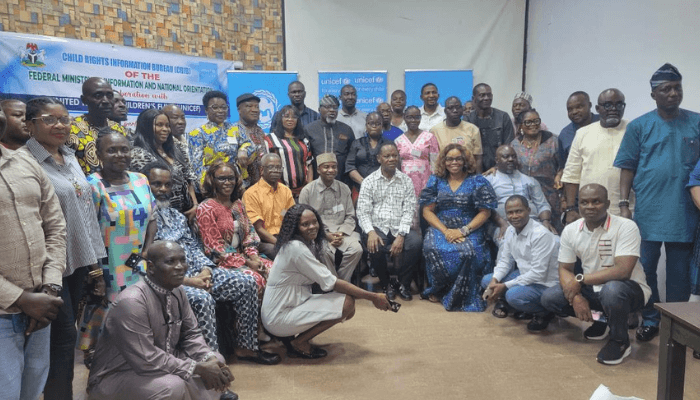FG, UNICEF sharpen media practitioners’ skills on ethical journalism, child rights reporting
A cross session of participants at the FG, UNICEF two-day capacity building for media practitioners on Ethical Journalism and Child Rights Reporting.
The Federal Ministry of Information and National Orientation, in partnership with the United Nations Children’s Fund (UNICEF), has organised a two-day capacity building for about 45 media practitioners to sharpen and strengthen their skills on Ethical Journalism and Child Rights Reporting.
The training organised by the Child Rights Information Bureau (CRIB) of the Federal Ministry of Information and National Orientation, held in Ibadan, Oyo State capital, was attended by media practitioners from Southwest states, Edo and Delta States.
In her keynote address, Celine Lafoucriere, UNICEF Chief of Lagos Field Office said ethical reporting was not just a professional standard, but a moral imperative.
Speaking on why ethical reporting for children matters for UNICEF, Lafoucriere opined that the reporting was to ensure that children are portrayed with dignity, their stories told with care, and their rights never compromised in the pursuit of headlines or money-making.
Lafoucriere noted that UNICEF believed that every child has the right to be seen, heard and protected.
While adding that media practitioners’ work was vital to the health of democracy and the well-being of our communities, she stated that ethical reporting was to protect the most vulnerable.
She posited that children were not miniature adults but are still developing emotionally, mentally and socially.
She advised media practitioners that when reporting on children, especially those affected by violence, conflict or abuse, it must be done with utmost sensitivity.
According to her, ethical reporting means protecting their identities, avoiding sensationalism, and ensuring that their voices are heard safely and respectfully.
“In a world where misinformation spreads rapidly, your commitment to truth, fairness, and balance is what sets you apart. When you report responsibly, you become a trusted source of information. You help communities understand, heal, and grow.
“The stories you tell influence how society sees its children, and how children see themselves. By choosing to report ethically, you are helping to build a Nigeria where every child is valued, protected, and allowed to thrive.
“This training is not just a workshop. It is a call to action. Over the next two days, we will explore the principles of ethical journalism, examine real-life case studies, and equip you with tools to navigate the complex realities of reporting on children.
“We will discuss how to balance the public’s right to know with a child’s right to privacy and protection.
“Let us remember, the way we report on children today shapes the kind of society we build tomorrow. By choosing ethics, you choose protection. You choose dignity. You choose a better future for every child in Nigeria.
“Our expectation is clear, that you leave this training not only with new skills, but with a renewed commitment to uphold the highest standards of journalism, especially when it comes to children,” she said.
Lafoucriere, however, hoped that the training would make the participants become champions of ethical reporting in their various newsrooms and communities, as well as set an example for others to follow.
She commended UNICEF`s government partners and communication team for organising the training, as well as media professionals and partners of West Nigeria for being part of the programme.
Earlier, Falayi Temitoye, assistant director/ head, Child Rights Information Bureau (CRIB), Federal Ministry of Information and National Orientation, Abuja, said the training was designed to help the media practitioners reflect on their ethical obligations.
Temitoye, who represented Ogbodo Chinasa Nnam, the Permanent Secretary, Federal Ministry of Information and National Orientation, noted that the programme would also enable journalists to explore best practices for reporting on children’s issues, and strengthen understanding of child rights as enshrined in national laws and international conventions.
“The media holds immense power, the power to inform, to inspire, and to hold institutions accountable. But with that power comes a profound responsibility, to report with integrity, sensitivity, and respect for human dignity.
“When it comes to stories involving children, that responsibility becomes even greater. Every image, every word, and every frame we publish can have lasting consequences on a child’s life, safety, and future.
“Through open discussion, case studies, and shared experiences, we aim to build a media culture that protects children’s identities, amplifies their voices responsibly, and upholds the highest ethical standards”, he stated.
On her part, Sussan Akila, acting chief of Communication, Advocacy and Partnership for UNICEF, Nigeria, posited that reporting ethically for children would help to protect them because they are the leaders of tomorrow.
“So, ethical reporting is very important so that we protect the rights of the children. We make sure that everything about them is being said the way it should be said and is being shown the way it should be shown. If it is an abuse of their rights, let it be fought in a way that justice will be done,” she added.
The communication experts who delivered lectures on various critical aspects of journalism are Charles Obot, a professor in the Department of Film and Multimedia Studies, University of Uyo, Akwa Ibom State, and Jide Johnson, director, Special Programmes, Nigerian Institute of Journalism (NIJ), Lagos.
Others are Geoffrey Njoku, Consultant, UNICEF, and Lekan Sote, a columnist with the Punch Newspaper.

